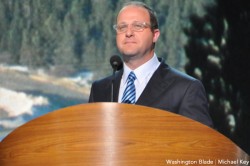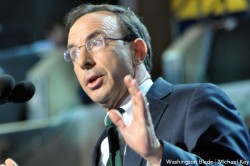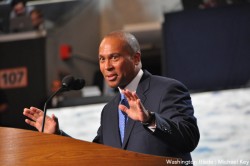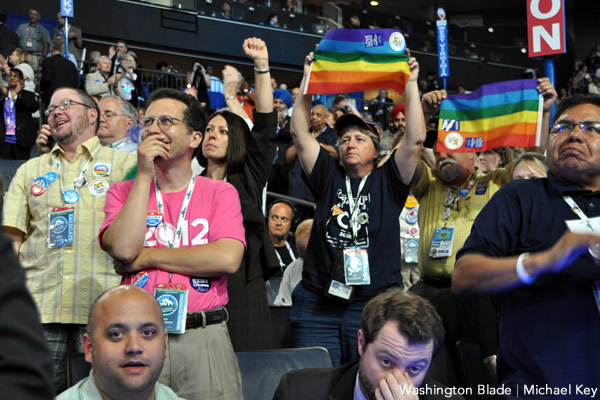National
DNC 2012: Gay speakers, issues pervade convention
Delegates approve platform backing marriage equality
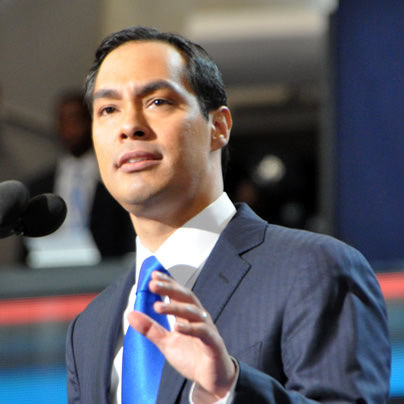
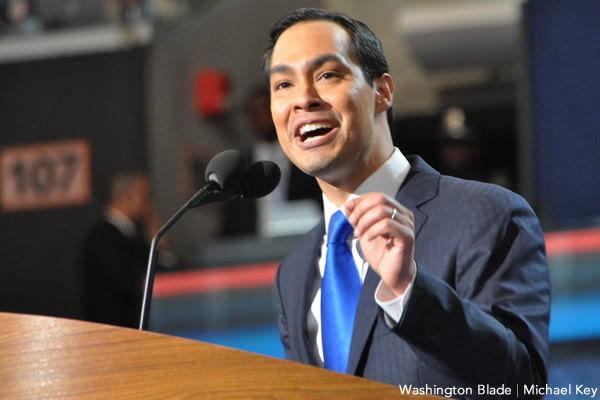
San Antonio Mayor Julian Castro dinged Mitt Romney at the Democratic National Convention for his opposition to marriage equality (Blade photo by Michael Key)
CHARLOTTE, N.C. — The first official day of the Democratic National Convention showcased the party’s solidarity with the LGBT community as speakers — including several openly gay Democrats — took to the podium to voice support and delegates approved for the first time a platform that endorses marriage equality.
Capping off the evening were high-profile speeches from San Antonio Mayor Julian Castro, who’s considered a rising star in the Democratic Party and possibly a contender for the next governor of Texas, and first lady Michelle Obama. Both mentioned LGBT rights in their speeches to attendees at the Time Warner Cable Arena.
Castro made a reference to marriage equality when reciting a list of issues supported by Democrats, but opposed by Republican presidential nominee Mitt Romney. The GOP candidate is against same-sex marriage and has endorsed a Federal Marriage Amendment.
“When it comes to getting the middle class back to work, Mitt Romney says, ‘No,'” Castro said. “When it comes to respecting women’s rights, Mitt Romney says, ‘No.’ When it comes to letting people marry whomever they love, Mitt Romney says, ‘No.'”
Castro continued that Romney also says “no” to expanding access to health care for all Americans, but noted Romney originally said “yes” to that — an allusion to the health care reform Romney helped pass into law as the Massachusetts governor. Castro added, “Gov. Romney has undergone an extreme makeover, and it ain’t pretty.”
The San Antonio mayor’s speech was a hit among attendees at the convention, who held up signs reading “Opportunity” and “Oportunidad” as he spoke.
Michelle Obama delivered a speech that was more personal, emphasizing her husband’s commitment to his family despite her concerns upon taking office about the sacrifices about what being president meant for their two daughters.
“But today, I have none of those worries from four years ago about whether Barack and I were doing what’s best for our girls,” Michelle Obama said. “Because today, I know from experience that if I truly want to leave a better world for my daughters, and all our sons and daughters … then we must work like never before, and we must once again come together and stand together for the man we can trust to keep moving this great country forward, my husband, our president, President Barack Obama.”
Michelle Obama also hit on her husband’s support for LGBT rights during her remarks when she spoke of his commitment to the people of diverse backgrounds, saying “Barack knows the American Dream because he’s lived it — and he wants everyone in this country to have that same opportunity, no matter who we are, or where we’re from, or what we look like, or who we love.”
The first lady’s speech was widely seen as successful. Attendees at the convention held up slim, vertical signs reading, “We love Michelle Obama” and cheered as she spoke.
Jerame Davis, executive director of the National Stonewall Democrats, noted Michelle Obama’s speech when talking about how Tuesday night at the Democratic convention strongly contrasted with “last week’s Republican hate-fest” in Tampa.
“First Lady Michelle Obama was inspirational and gave us a glimpse of the love she has for her family,” Davis said. “She is the heart and soul of the first family and that was on full display tonight.”
In a historic development, the 5,963 delegates to the convention approved a Democratic platform that for the first time includes a plank supporting marriage equality. Language in the platform also rejects the Defense of Marriage Act and affirms support for the Employment Non-Discrimination Act.
New Jersey Mayor Cory Booker, a co-chair of the platform committee, said prior to the final approval the manifesto embodies the principles of the Democratic Party, including the notion that individuals should be able to pursue the American dream regardless of, among other factors, whom they love.
“This platform of big and practical ideas sets forth an emboldened pathway toward the historic hope which has driven generations of Americans forward,” Booker said. “It is our most fundamental national aspiration—that no matter who you are, no matter what your color, creed, how you choose to pray or who you choose to love, that if you are an American — first generation or fifth — one who is willing to work hard, play by the rules and apply your God-given talents—that you should be able to find a job that pays the bills.”
Delegates approved the platform by a loud voice vote when Democratic National Committee Chair and Los Angeles Mayor Antonio Villaraigosa asked for “yays” and “nays” to accept the manifesto. No one was heard voicing objection to the platform when Villaraigosa asked for the “nays.”
In addition to the high-profile speeches at the end of the evening, at least four openly gay speakers were among those delivering remarks from the podium. Democratic National Committee Treasurer Andrew Tobias, Democratic National Convention Committee CEO Stephen Kerrigan and Service Employees International Union Mary Kay Henry and U.S. Rep. Jared Polis (D-Colo.) delivered remarks.
A primetime speaking slot was awarded to Polis, who is slated to become the most senior openly gay member in the lower chamber of Congress upon the start of next year after Reps. Barney Frank (D-Mass.) and Tammy Baldwin (D-Wis.) finish their final terms as U.S. House members.
Polis wasn’t shy about talking about his sexual orientation during his speech. He declared he was gay among other things upon taking the stage, saying, “My name is Jared Polis. My great-grandparents were immigrants. I am Jewish. I am gay. I am a father. I am a son. I am an entrepreneur. I am a congressman from Colorado. I am always an optimist. But first and foremost, I am an American.”
The first openly gay parent to serve in Congress, Polis mentioned his partner, Marlon Reis, by name while emphasizing respect for diversity — for people who may identify as LGBT and others who hold views that are either conservative or progressive.
“So tonight, I don’t just ask my fellow Americans to respect my relationship with my partner Marlon and my role as a father to our son,” Polis said. “I also ask them to respect the Christian family concerned about decaying moral values and crass commercialism. I ask them to respect the difficult decision of a single mother to bring a child into this world, because of her heartfelt beliefs.”
Polis mentioned some of Obama’s pro-LGBT initiatives that he said demonstrates the president’s understanding that progress can only be achieved by working together.
“It is why he repealed ‘Don’t Ask, Don’t Tell,’ so that no person is prevented from serving the country they love because of whom they love,” Polis said. “And it is why Barack Obama became the first sitting president in American history to show his personal support for same-sex marriage.”
Tobias, who spoke earlier in the day, said his speech marked the fourth time he’s addressed a Democratic National Convention and noted each time he’s made an address he talks about two things: money and equality.
Praising Obama for his work over his first term, Tobias said the administration has “dramatically improved” the lives of millions of LGBT Americans and “at no cost” to anyone else.
Tobias also offered a personal anecdote about being gay as a way to demonstrate the tremendous progress that has been made on LGBT rights in the past few decades.
“In college, I thought I was the only guy in the world who liked other guys,” Tobias said. “Later I found there was someone else like me, our 26-year-old resident tutor. He and I never talked about it at the time. No one talked about being gay back then. People killed themselves over being gay. Tragically, some kids still do.”
Tobias later revealed the identity of that resident tutor, saying he wed another man at a wedding just eight weeks ago, where love that was “unspeakable” nearly a half-century ago was celebrated “by hundreds of people — straight and gay, surfers and senators.”
“In a way, it was a wedding that married my two topics — money and equality — because that young tutor had grown up to become the chairman of the House Financial Services Committee: Barney Frank,” Tobias said.
Kerrigan, who was charged with managing the convention, made no explicit mention of his sexual orientation or LGBT issues during his speech and instead talked about the opportunities at the convention and access through digital media. Neither did SEIU’s Henry, who focused on labor issues while criticizing Romney, saying “Time after time, working families have paid the price for Mitt Romney’s success.”
Many other speakers throughout the evening also hit on LGBT rights as they praised President Obama. They include U.S. Senate candidate Tim Kaine, who said Obama kept his commitment to “fair treatment for LGBT Americans.” Recognition of Obama’s push to end “Don’t Ask, Don’t Tell” came in addition to Polis from Massachusetts Gov. Deval Patrick; platform committee co-chair and first woman to reach the rank of three-star general in the Army, retired Lt. Gen. Claudia Kennedy; U.S. House candidate Tammy Duckworth; Chicago Mayor Rahm Emanuel; Maya Soetoro-Ng, Obama’s sister; and actor and former White House official Kal Penn.
Richard Socarides, a gay delegate from New York City and former adviser to President Clinton on LGBT rights, said the developments at the convention added up to “a historic night” for the LGBT community and “a great night for our party.”
“Our platform plank was adopted plus every speaker seemed so proud to be the party of all America, including us,” Socarides said. “I thought — we are part of this party’s vision of America.”
The pro-LGBT developments came in stark contrast to last week’s Republican National Convention, when no openly speaker was at the podium and speakers advocated for traditional marriage. Delegates in Tampa also approved a platform limiting marriage to one man, one woman and endorsing a Federal Marriage Amendment.
Jimmy LaSalvia, executive director of the gay conservative group GOProud, nonetheless was dismissive of what happened on the first night of the Democratic convention.
“Nothing that they could put in the platform would do anything to cover up President Obama’s disastrous record on jobs and the economy,” LaSalvaia said. “All the openly gay speakers and wonderful feel-good platform language won’t change the fact that, just like everyone else in America, gay people aren’t any better off than they were four years ago.”

Texas state Rep. James Talarico won a hard-fought primary Tuesday to become the state’s Democratic nominee for U.S. Senate, defeating U.S. Rep. Jasmine Crockett in one of the year’s most closely watched and competitive Democratic contests.
Talarico, a Presbyterian seminarian and three-term lawmaker from Round Rock, was declared the winner by the Associated Press early Wednesday morning after a closely tracked vote count that drew national attention.
“Tonight, the people of our state gave this country a little bit of hope,” Talarico told the AP. “And a little bit of hope is a dangerous thing.”
With 52.8% of the vote to Crockett’s 45.9%, Talarico secured the nomination outright, avoiding a runoff and capping months of sharp contrasts between the two candidates over strategy, messaging, and how best to compete statewide in Texas. Democrats hope the competitive primary — and the relatively narrow margin — signals growing momentum in a state that has not elected a Democrat to the U.S. Senate since 1988.
Talarico has long expressed support for the LGBTQ community, a position he highlights prominently on his campaign website. Under the “Issues” section, he directly addresses assumptions that might arise from his faith and background as a seminarian in a deeply conservative state.
“My faith in Jesus leads me to reject Christian Nationalism and commit myself to the project of democracy,” his website reads. “Because that’s the promise of America: a democracy where every person and every family — regardless of religion, race, gender, sexual orientation, or any other difference between us — can truly be free and live up to their full potential.”
Crockett struck a conciliatory tone following her defeat, emphasizing party unity ahead of November.
“This morning I called James and congratulated him on becoming the Senate nominee,” Crockett told Politico. “Texas is primed to turn blue and we must remain united because this is bigger than any one person. This is about the future of all 30 million Texans and getting America back on track.”
Talarico also drew national attention earlier in the race when “Late Show” host Stephen Colbert said he was initially unable to air an interview with the state legislator due to potential FCC concerns involving CBS. The episode sparked a broader political debate.
Brendan Carr, chair of the Federal Communications Commission, appointed by President Donald Trump, told reporters the controversy was a “hoax,” though he also acknowledged Talarico’s ability to harness the moment to build support as an underdog candidate. The interview was later released online and garnered millions of views, boosting Talarico’s national profile.
In November, Talarico will face the winner of the Republican primary between incumbent Sen. John Cornyn and Texas Attorney General Ken Paxton, who have been locked in a bruising GOP contest. Rep. Wesley Hunt was also in the Republican primary field. The GOP race is expected to head to a May runoff.
In a joint statement, Senate Minority Leader Chuck Schumer and Democratic Senatorial Campaign Committee Chair Kirsten Gillibrand praised Talarico’s victory and framed him as a candidate capable of broad appeal.
“As an eighth-generation Texan, former middle school teacher, and Presbyterian seminarian, James will be a fighter for Texans from all walks of life and of all political stripes,” they said. “In November, Texans will elect a champion for working people: James Talarico.”
National
Peter Thiel’s expanding power — and his overlap with Jeffrey Epstein
Gay billionaire’s name appears 2,200 times in files, but no criminality alleged

There are few figures in modern politics whose reach extends across Silicon Valley, Wall Street, and Washington, D.C., as Peter Thiel’s.
A billionaire venture capitalist, Thiel built his fortune at the dawn of the internet age and has since positioned himself at the highest levels of U.S. technology, finance, and national defense infrastructure. He is best known as a co-founder of PayPal, an early investor in Facebook, and the co-founder of Palantir Technologies — a data analytics firm that maintains significant contracts with U.S., U.K., and Israeli defense and intelligence agencies.
Over the last two decades, Thiel has also built an interconnected network of investment vehicles — Clarium Capital, Founders Fund, Thiel Capital, Valar Ventures, and Mithril Capital — giving him influence over emerging technologies, political candidates, and ideological movements aligned with his worldview. Through these firms, Thiel has backed companies in artificial intelligence, defense technology, biotech, cryptocurrency, and financial services, often positioning himself early in sectors that later became central to public policy debates.
Born in Frankfurt, West Germany, in 1967, Thiel immigrated to the United States as an infant. He later attended Stanford University, earning a degree in philosophy before graduating from Stanford Law School in 1992. As an undergraduate, he founded The Stanford Review, a conservative student publication that opposed what it described as campus “political correctness.” The paper became a platform for combative and contrarian arguments that previewed themes Thiel would revisit in later essays and speeches about elite institutions, democracy, and technological stagnation.
Thiel’s professional ascent coincided with the explosive growth of the dot-com era. In 1998, he co-founded PayPal, helping pioneer digital payment systems that would become foundational to online commerce. When the company was sold to eBay in 2002 for $1.5 billion, Thiel emerged a multimillionaire and part of what would later be known as the “PayPal Mafia” — a loose but influential network of founders and early employees who went on to launch or invest in some of Silicon Valley’s most dominant firms.
In 2004, Thiel made one of the most consequential investments of his career, providing $500,000 in seed funding to Facebook, then a fledgling social network founded by Mark Zuckerberg. He became the company’s first outside investor and later served on its board. That early bet proved extraordinarily lucrative and cemented Thiel’s status as a major venture capitalist with a reputation for identifying transformative platforms before they reached scale.
The same year, he co-founded Palantir Technologies. Initially backed in part by In-Q-Tel, the CIA’s venture capital arm, Palantir developed software — including its Gotham platform — designed to help defense, intelligence, and law enforcement agencies integrate and analyze massive datasets. The company’s tools allow users to map relationships, identify patterns, and visualize complex networks across financial records, communications data, and other digital trails.
Over time, Palantir secured billions of dollars in public-sector contracts. It has worked with the U.S. Department of Defense, Immigration and Customs Enforcement, the Centers for Disease Control and Prevention, and allied governments abroad. Public reporting has documented that its global government contracts exceed $1.9 billion, including agreements with Israeli defense entities — relationships that reportedly expanded following the Oct. 7 attacks in Israel. Critics have raised concerns about civil liberties and surveillance, while supporters argue the company provides essential national security tools.
By the mid-2000s, Thiel was no longer simply a wealthy entrepreneur. He was a financier operating at the intersection of capital, advanced technology, and government — with investments embedded in some of the country’s most sensitive security systems. His political giving would later extend that influence further, including support for candidates aligned with his populist and nationalist leanings– notably Donald Trump in 2016.
As his wealth and influence expanded, so too did his proximity to other powerful — and, in some cases, controversial — figures in global finance.
Among them was Jeffrey Epstein.
Thiel’s name appears more than 2,200 times in documents released so far by the U.S. Department of Justice related to Epstein. A name appearing in legal filings does not, by itself, indicate wrongdoing. However, the extensive references illustrate that Epstein’s social and financial network intersected with elite figures in technology, academia, politics, and finance — including individuals connected to Thiel’s business and philanthropic circles.
Epstein’s legal troubles became public in 2005, when police in Palm Beach, Fla., investigated allegations that he had sexually abused a minor. In 2008, he pleaded guilty in state court to soliciting prostitution from a minor under a plea agreement that was widely criticized as unusually lenient. He served 13 months in county jail with work-release privileges and was required to register as a sex offender. Comparable federal charges can carry significantly longer sentences.
Despite that conviction, Epstein continued to maintain relationships with prominent business and political figures for years. The extent to which members of elite networks remained in contact with him after his guilty plea has been the subject of extensive scrutiny.
Documents released by the Justice Department indicate that individuals connected to Thiel’s philanthropic and investment circles communicated with Epstein after his conviction. One document shows an invitation, sent on behalf of the Thiel Foundation, for Epstein to attend a technology event in San Francisco. Additional financial records and reporting indicate that between 2015 and 2016, Epstein invested approximately $40 million in funds managed by Valar Ventures, one of Thiel’s firms. Other records reflect meetings and correspondence, at times arranged through intermediaries. Epstein also extended invitations to his Caribbean residence.
There is no evidence that Thiel was involved in Epstein’s criminal conduct. The documented interactions do, however, show numerous planned meetings between the two both in the Caribbean (where Epstein’s infamous island is located) and across the world, while also raising questions about why business relationships continued after Epstein had pleaded guilty to a sex offense involving a minor and was a registered sex offender. For critics, that continued engagement speaks to the insular nature of elite finance, where access to capital and networks can override reputational risk.
Palantir represents another overlap. In emails made public through Justice Department releases, Epstein referenced Palantir in correspondence with Ehud Barak, the former Israeli prime minister who also maintained ties to Epstein. The emails do not indicate that Epstein had operational involvement in Palantir or access to its systems, however, they show that he discussed one of Thiel’s most strategically significant companies — a firm deeply integrated into Western defense and intelligence systems — with senior political figures abroad.
Separately, Thiel’s long-running dispute with Gawker Media offers additional insight into how he has exercised power outside traditional political channels.
After Gawker published an article in 2007 that publicly identified Thiel as gay, he later secretly funded litigation brought by professional wrestler Hulk Hogan over the outlet’s publication of a sex tape. The lawsuit resulted in a $140 million judgment against Gawker, which ultimately filed for bankruptcy. Thiel later confirmed his financial backing of the case, framing it as a defense of privacy and a response to what he considered reckless media behavior.
The episode demonstrated Thiel’s willingness to deploy substantial financial resources strategically and, at times, discreetly. It also illustrated how wealth can be used to influence institutions — whether through venture capital, political donations, or litigation.
Taken together, the record does not establish criminal liability for Thiel in connection with Epstein. It does, however, situate him within a dense web of elite finance, national security contracting, political influence, and reputation management. As additional documents related to Epstein continue to emerge, that web — and the decisions made within it — remains a subject of public interest and ongoing scrutiny.
National
Supreme Court deals blow to trans student privacy protections
Under this ruling, parents are entitled to be informed about their children’s gender identity at school, regardless of state protections for student privacy.

The Supreme Court on Monday blocked a California policy that allowed teachers to withhold information about a student’s gender identity from their parents.
The policy had permitted California students to explore their gender identity at school without that information automatically being disclosed to their parents. Now, educators in the state will be required to inform parents about developments related to a student’s gender identity, depending on how the case proceeds in lower courts.
The case involves two sets of parents — identified in court filings as John and Jane Poe and John and Jane Doe — both of which say their daughters began identifying as boys at school without their knowledge, citing religious objections to gender transitioning.
The Poes say they only learned about their daughter’s gender dysphoria after she attempted suicide in eighth grade and was hospitalized. After treatment for the attempt and after being returned to school the following year, teachers continued using a male name and pronouns despite the parents’ objections, citing California law. The Poes have since placed their daughter in therapy and psychiatric care.
Similarly, the Does say their daughter has intermittently identified as a boy since fifth grade, but while their daughter was in seventh grade, they confronted school administrators over concerns that staff were using a male name and pronouns without informing them. The principal told them state law barred disclosure without the child’s consent.
Both sets of parents filed lawsuits in the U.S. District Court for the Southern District of California challenging the state policy that protects students’ gender identity and limits when schools can disclose that information to parents.
The justices voted along ideological lines, with the court’s six conservative members in the majority and the three liberal justices dissenting.
“We conclude that the parents who seek religious exemptions are likely to succeed on the merits of their Free Exercise Clause claim,” the court said in an unsigned order. “The parents who assert a free exercise claim have sincere religious beliefs about sex and gender, and they feel a religious obligation to raise their children in accordance with those beliefs. California’s policies violate those beliefs.”
In dissent, the three liberal justices argued that the case is still working its way through the lower courts and that there was no need for the high court to intervene at this stage. Justice Elena Kagan wrote, “If nothing else, this Court owes it to a sovereign State to avoid throwing over its policies in a slapdash way, if the Court can provide normal procedures. And throwing over a State’s policy is what the Court does today.”
Conservative Justices Samuel Alito and Clarence Thomas indicated they would have gone further and granted broader relief to the parents and teachers challenging the policy.
The emergency appeal from a group of teachers and parents in California followed a decision from the United States Court of Appeals for the Ninth Circuit that allowed the state’s policy to remain in effect. The appeals court had paused an order from U.S. District Judge Roger Benitez — who was nominated by George W. Bush — that sided with the parents and teachers and put the policy on hold.
The legal challenge was backed by the Thomas More Society, which relied heavily on a decision last year in which the court’s conservative majority sided with a group of religious parents seeking to opt their elementary school children out of engaging with LGBTQ-themed books in the classroom.
California Attorney General Rob Bonta expressed disappointment with the ruling. “We remain committed to ensuring a safe, welcoming school environment for all students while respecting the crucial role parents play in students’ lives,” his office said in a statement.
The decision comes as the Trump administration has taken a hardline approach to transgender rights. During his State of the Union address last week, President Donald Trump referenced Sage Blair, who previously identified as transgender and later detransitioned, describing Blair’s experience transitioning in a public school. According to the president, school employees supported Blair’s chosen gender identity and did not initially inform Blair’s parents.

Last year, the court upheld Tennessee’s ban on gender-affirming medical care for transgender minors and has allowed enforcement of a policy barring transgender people from serving in the military to continue during Trump’s second term.


